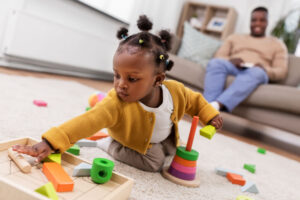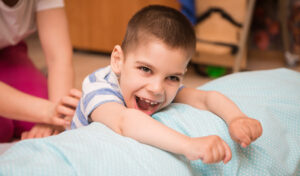What Are Developmental Delays in Children?
Children are expected to hit certain developmental milestones based on their age. If a child misses these milestones, they may be showing signs of a developmental delay.
Developmental milestones are things that at least 75% of children are able to do by a certain age, according to the Centers for Disease Control and Prevention (CDC).
Delays in early physical, cognitive, and social abilities may be a sign of an underlying condition that needs to be addressed, like an injury caused by a doctor or health care professional’s negligence during the child’s birth.
 If a preventable birth injury caused your child to experience a developmental delay, we may be able to pursue compensation on your behalf that can help support your child as they learn to navigate the world around them.
If a preventable birth injury caused your child to experience a developmental delay, we may be able to pursue compensation on your behalf that can help support your child as they learn to navigate the world around them.
Let us put our experience to work for your family. Call (800) 995-1212 now to get started for free.
“My baby had to stay in the NICU. Now, she is almost 3 and isn’t developing like other kids. Sokolove Law helped us fight for justice and get the money we needed to give our child special care and treatments. I can’t thank Sokolove Law enough."
– Mother in Massachusetts & Firm Client
Four Types of Developmental Delay in Children
Parents and health care providers should monitor children to ensure they are developing skills in a few distinct areas as they age. However, children with developmental delays may not acquire these skills as quickly as others.
According to the Cleveland Clinic, there are four types of development delays:
- Cognitive delays impact the way children learn, think, problem-solve, and understand information. These often become more apparent when a child goes to school.
- Language delays and speech delays limit a child’s ability to understand and identify words, like colors or body parts. They can interfere with communication and self-expression.
- Motor delays impact fine motor skills, like holding onto something small or tying their shoes, and gross motor skills, like crawling or rolling over.
- Social, emotional, and behavioral delays affect a child’s ability to interact and get along with others and may cause difficulty expressing feelings or recognizing social cues.
When children experience delays in multiple areas of development, it’s known as global developmental delay.
If your child seems to be missing key milestones or is developing slower than other children their age, there may be an underlying cause — like a birth injury caused before, during, or directly after labor.
At Sokolove Law, we have registered nurses on staff who can listen to your story and help you determine if your child may have been injured at birth.
Developmental Delay Symptoms: Is Your Child Missing Developmental Milestones?
Development is not the same for all children, and some kids may achieve certain skills before others. Reaching developmental milestones by a certain age can be a way to monitor whether or not your child is developing healthily.
While some early signs of developmental delay may be obvious to parents — especially for adults who have raised another child — other delays may not be apparent until the child is several years old.
Learn more about the warning signs of developmental delay for different age groups based on the CDC’s milestone checklist below.
Signs of Developmental Delay in Newborns (0-2 Months)
From the time a child is born to when they’re 2 months old, there are a few milestones they will typically hit.
Warning Signs of Developmental Delay in 2-Month-Olds
- Being unable to hold their head up or make fluid movements with their limbs
- Failing to track objects with their eyes
- Only crying or laying silent, not babbling or making gurgling sounds
- Not smiling, looking at their parents, or turning their head toward sounds
Be sure to monitor your baby for weak reflexes, difficulty eating, or excessive fussiness, as these may all be considered symptoms of developmental delays in newborns.
Signs of Developmental Delays in Infants (Up to 12 Months)
As your child graduates from newborn to infant, there are new cognitive, physical, and emotional skills they should develop. During these months, many early signs of developmental delay may become apparent.
6-Month-Old Milestones: Identifying Delays
- Being unable to roll over in either direction
- Failing to respond to sounds or their own name
- Not bringing items to their mouth or passing objects from one hand to the other
- Not recognizing the difference between familiar faces and the faces of strangers
12-Month-Old Milestones: Red Flags
- Being unable to make basic gestures like waving goodbye or shaking their head “no”
- Being unable to walk while holding onto something like a table or chair
- Not mimicking words said to them and or saying simple words like “dada” or “mama”
- Refusing to engage in games like “peek-a-boo”
- Struggling or failing to pull themselves up into a standing position
If your child is not meeting the milestones listed above, they may be experiencing a developmental delay.
Call (800) 995-1212 now to learn more about what this may mean for your child.
Signs of Developmental Delays in Toddlers (18 Months-4 Years)
 Symptoms of developmental delays may not be apparent until well after a child’s first year of life. Developmental disabilities, like cerebral palsy and epilepsy, may also become apparent during your child’s toddler years.
Symptoms of developmental delays may not be apparent until well after a child’s first year of life. Developmental disabilities, like cerebral palsy and epilepsy, may also become apparent during your child’s toddler years.
When to Worry About 18-Month-Old Development
- Being unable to eat with a spoon or drink from a cup
- Having less than 6 different words in their vocabulary
- Never copying the actions of others
- Not paying attention to their caregiver entering or leaving the room
- Not showing affection toward familiar people
Indicators of Developmental Delay in 2-Year-Olds
- Being unable to stand on their tiptoes
- Not saying simple phrases like “eat food”
- Never repeating words overheard in conversations
- Struggling to use common objects like a fork
3-Year-Old Developmental Delay Warning Signs
- Being unable to use simple puzzles, peg boards, or other basic toys
- Falling down a lot while walking
- Not making eye contact with other people
- Showing little to no interest in playing with toys or other children
Missed Milestones in 4-Year-Olds
- Being unable to remember parts of a story you tell them
- Failing to interact well with other children and adults
- Having difficulty speaking clearly or being understood
- Incorrectly use words like “you” or “me”
- Not following simple commands
- Struggling to scribble or holding a pencil
Many children with developmental delays can work with physical therapists, speech-language pathologists, or occupational therapists to improve their skills and meet age-appropriate milestones.
If you think your child may be showing signs of developmental delay caused by an injury at birth, you may be able to pursue compensation that can help pay for your child’s care.
Contact our team now for free help determining if malpractice may be to blame for your child’s missed developmental milestones.
What Are Causes of Developmental Delay in Children?
Developmental delays often occur due to something that happened to the baby before, during, or shortly after delivery.
In many cases, these injuries may be the result of a medical professional not reacting or responding to a difficult delivery properly, which is considered medical malpractice.
A doctor or health care professional may:
- Pull on the baby’s head during difficult deliveries, potentially injuring the child’s brachial plexus nerves and causing Erb’s palsy, which can cause motor delays
- Fail to treat jaundice in a newborn, potentially causing kernicterus, a form of brain damage that can result in hearing loss and cerebral palsy, which can cause multiple kinds of developmental delays in children
- Use forceps or vacuum extractors to free the baby from the birth canal and cause brain damage or other injuries, potentially causing global developmental delays
Sadly, there are many possible reasons for a child to experience developmental delay. The cause of a developmental delay may not be immediately clear, according to the Hassenfeld Children’s Hospital at NYU Langone.
Our on-staff nurses have decades of labor and delivery experience. They can help you determine if something that happened during pregnancy or delivery may have contributed to your child’s condition.
Learn More About Your Options
If you believe your child’s experiencing developmental delays due to a medical mistake, a birth injury lawyer with Sokolove Law can help you understand your legal options.
Birth Injury Compensation for Developmental Delay
Because negligence is often to blame for birth injuries, families facing the unexpected costs of caring for a child with special needs may be able to take legal action and pursue justice on their child’s behalf.
Filing a birth injury lawsuit can provide families with compensation that may help their child live a happier, healthier life.
Birth injury compensation can help pay for many expenses, including:
If your child may be missing developmental milestones due to medical malpractice, our birth injury lawyers are here to help.
Call (800) 995-1212 now to learn if you may be eligible to pursue compensation on your child’s behalf.
“Our daughter's traumatic birth left us devastated. She suffered a brain bleed and spent 2 months in the NICU. Now, almost 4, she faces numerous issues, and I can't work as I need to care for her. Sokolove Law stepped in and helped us fight for justice. With their help, we can now breathe a little easier, knowing our daughter's needs will be met.”
– Sokolove Law Birth Injury Client
Sokolove Law: Fighting for Children and Families Nationwide
Developmental delays in children may occur as a result of medical negligence or malpractice — and these errors have the potential to impact your child throughout their life.
 The costs of caring for a child with a developmental delay can add up quickly, which is why our attorneys will fight for the most amount of compensation possible in your case.
The costs of caring for a child with a developmental delay can add up quickly, which is why our attorneys will fight for the most amount of compensation possible in your case.
Since 1979, we’ve secured over $962 Million for families impacted by birth injuries.
As a national birth injury law firm, Sokolove Law can help families in all 50 states seek justice for their child and hold the negligent medical professional responsible for their injuries accountable.
Let us fight for the justice you deserve. Call (800) 995-1212 or get a free case review now to learn how we may be able.
Signs of Development Delay in Babies FAQs
What can cause developmental delays in children?
Developmental delays can be caused by many factors, like genetic conditions or premature birth. In some cases, developmental delays may also be caused by a preventable birth injury.
In these instances, a doctor or medical professional may have used an instrument improperly or failed to notice problems before birth that could possibly have been corrected, or used excessive force during the birthing process.
At Sokolove Law, we have registered nurses on staff who can help you figure out what may have caused your child’s developmental delay. Fill out our contact form now to learn more.
What are some of the symptoms of developmental delays?
Signs of a developmental delay will vary based on the child’s age and the type of developmental delay they are experiencing.
Some developmental delay symptoms may include:
- Failure to understand social cues
- Difficulty speaking or communicating with others
- Trouble with movement or motor skills
- Withdrawn behavior or little desire to play with others
Contact Sokolove Law today for free help determining if medical malpractice may have played a role in your child's developmental delays.
What are red flags in child development?
Red flags in child development are warning signs that a child might not be progressing as expected.
Signs that a child isn’t developing properly may include not:
- Making sounds other than crying by 2 months old
- Reaching for toys by 6 months
- Sitting unassisted by 9 months old
- Pulling themselves up to stand by 12 months old
- Putting at least two words together to communicate an idea by 2 years old
- Noticing and joining other children in play by 3 years old
- Catching a large ball or unbuttoning some buttons by 4 years old
Call (800) 995-1212 now to speak to a registered nurse and get help determining if medical malpractice may have played a role in your child's developmental delays.
When should I be concerned about developmental delays?
If your child misses key developmental milestones within the first few months or years of their life, like rolling over, talking, or playing with others, it may be cause for concern.
Early intervention for developmental delay is crucial. While children typically undergo general developmental screenings throughout their early years, you shouldn’t wait to consult a doctor if you notice your child has missed these milestones.
When is a milestone considered delayed?
A milestone is considered delayed when a child doesn't reach it within the typical age range. For example, if most children walk by 12 months and a child hasn't started walking by 18 months, that's considered a delay.
If you believe your child’s developmental delay may have been caused by a birth injury, call (800) 995-1212 now. We can help you determine if you may be eligible to pursue compensation from a birth injury lawsuit.
When can you first notice signs of developmental delay?
Some early signs of developmental delay can be noticeable within a child’s first few hours in the hospital. However, some developmental delays may not be apparent until months or years after a child is born.
What happens if a baby doesn’t meet developmental milestones?
If a baby doesn’t meet developmental milestones, it could indicate they have an underlying condition that needs to be addressed.
If your child is missing milestones, consult a doctor as soon as possible. Early intervention and support can often help address the underlying causes and improve the child's development.
What are some common developmental delays?
Language and speech skills are the most common type of developmental delay, according to the American Academy of Pediatrics.
This may include difficulty:
- Speaking or making sounds
- Forming sentences
- Following directions
- Naming items a caregiver points to
- Retelling or making up stories
- Asking who, what, where, why, and when questions
Call (800) 995-1212 now for free help determining if medical malpractice may have played a role in your child's developmental delays.
How much does it cost to work with a developmental delay lawyer?
At Sokolove Law, there are no upfront or hourly fees to file a birth injury lawsuit with our developmental delay attorneys.
We work on a contingency-fee basis, which means we only get paid if we successfully secure compensation for you.
Contact us for a free, no-obligation case review to learn how we may be able to help you pursue justice for your child.
When should I worry if my baby can’t sit up?
If a child isn't able to sit up unassisted by 9 months old, they may be experiencing a gross motor skills delay. The CDC recommends parents talk to a pediatrician if their child doesn't meet this important milestone.
Reasons why a baby can’t sit up may include:
- Developmental disorders like cerebral palsy or autism spectrum disorder
- Genetic disorders like Down syndrome
- Health complications caused by a premature birth
- Other issues impacting muscle development and function
Physical and occupational therapy can help many children improve their gross motor skills.
